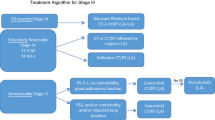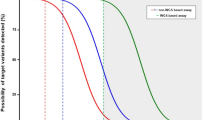Abstract
Background
Immunotherapy based on programmed cell death protein 1 (PD-1)/programmed death-ligand 1 (PD-L1) inhibitors has revolutionized the treatment of non-small cell lung cancer (NSCLC). Patients with high PD-L1 expression or DNA mismatch repair deficiency (dMMR)/microsatellite instability-high (MSI-H) cancer are reported to benefit from PD-1/PD-L1 inhibitors. However, additional biomarkers are needed, and whether tumor mutation burden (TMB) can be a robust biomarker or not is still controversial.
Objective
We conducted this study to assess TMB as a biomarker for PD-1/PD-L1 inhibitor treatment in advanced NSCLC patients in a real-world setting.
Patients and Methods
Chinese NSCLC patients who received a PD-1/PD-L1 inhibitor at the People’s Liberation Army General Hospital and who had pathological tissues available for TMB were retrospectively analyzed. Demographic and clinical information were evaluated. Targeted next-generation sequencing (NGS) of the tumor tissue was performed. The relationship between TMB and clinical benefit was assessed.
Results
Thirty-four patients treated with PD-1/PD-L1 inhibitors between March 2015 and January 2019 were analyzed. The TMB was greater in patients with complete response (CR)/partial response (PR) versus stable disease (SD) versus progressive disease (PD) (median 11 vs. 9.7 vs. 4.2 mutations/megabase [Mb]; p = 0.049). The median progression-free survival was 10.6 months in the TMB-high group versus 3.9 months in the TMB-low group (cut-off value = 10 mutations/Mb) (hazard ratio [HR] 0.26 [95% confidence interval 0.12–0.57], p = 0.0007). The median overall survival was 21.0 months and 11.6 months (HR 0.37 [0.17–0.81], p = 0.0126) in the TMB-high group and the TMB-low group, respectively. The disease control rate was higher in the TMB-high group than in the TMB-low group (100% vs. 70%, p = 0.024).
Conclusions
High TMB was associated with a better outcome in advanced NSCLC patients who received PD-1/PD-L1 inhibitors in China. Further studies are needed to confirm our findings.




Similar content being viewed by others
Availability of Data and Material
The datasets used and analyzed during the current study are available from the corresponding author on reasonable request.
References
Brahmer J, Reckamp KL, Baas P, et al. Nivolumab versus docetaxel in advanced squamous-cell non-small-cell lung cancer. N Engl J Med. 2015;373:123–35.
Borghaei H, Paz-Ares L, Horn L, et al. Nivolumab versus docetaxel in advanced nonsquamous non-small-cell lung cancer. N Engl J Med. 2015;373:1627–39.
Garon EB, Rizvi NA, Hui R, et al. Pembrolizumab for the treatment of non-small-cell lung cancer. N Engl J Med. 2015;372:2018–28.
Reck M, Rodríguez-Abreu D, Robinson AG, et al. Pembrolizumab versus chemotherapy for PD-L1-positive non-small-cell lung cancer. N Engl J Med. 2016;375:1823–33.
Ribas A, Wolchok JD. Cancer immunotherapy using checkpoint blockade. Science. 2018;359:1350–5.
Mok TSK, Wu YL, Kudaba I, et al. Pembrolizumab versus chemotherapy for previously untreated, PD-L1-expressing, locally advanced or metastatic non-small-cell lung cancer (KEYNOTE-042): a randomised, open-label, controlled, phase 3 trial. Lancet. 2019;393(10183):1819–30.
Warth A, Korner S, Penzel R, et al. Microsatellite instability in pulmonary adenocarcinomas: a comprehensive study of 480 cases. Virchows Arch. 2016;468:313–9.
Rizvi NA, Hellmann MD, Snyder A, et al. Cancer immunology. Mutational landscape determines sensitivity to PD-1 blockade in non-small cell lung cancer. Science. 2015;348:124–8.
Rizvi H, Sanchez-Vega F, La K, et al. Molecular determinants of response to anti-programmed cell death (PD)-1 and anti-programmed death-ligand 1 (PD-L1) blockade in patients with non-small-cell lung cancer profiled with targeted next-generation sequencing. J Clin Oncol. 2018;36:633–41.
Carbone DP, Reck M, Paz-Ares L, et al. First-line nivolumab in stage IV or recurrent non-small-cell lung cancer. N Engl J Med. 2017;376:2415–26.
Hellmann MD, Ciuleanu TE, Pluzanski A, et al. Nivolumab plus ipilimumab in lung cancer with a high tumor mutational burden. N Engl J Med. 2018;378:2093–104.
Peters S, Creelan B, Hellmann MD, et al. Abstract CT082: impact of tumor mutation burden on the efficacy of first-line nivolumab in stage iv or recurrent non-small cell lung cancer: an exploratory analysis of CheckMate 026. 2017.
Shu Y, Wu X, Tong X, Wang X, Chang Z, Mao Y, et al. Circulating tumor DNA mutation profiling by targeted next generation sequencing provides guidance for personalized treatments in multiple cancer types. Sci Rep. 2017;7:583.
Yang Z, Yang N, Ou Q, Xiang Y, Jiang T, et al. Investigating novel resistance mechanisms to third generation EGFR tyrosine kinase inhibitor osimertinib in non-small cell lung cancer patients. Clin Cancer Res. 2018;24:13.
Koboldt DC, Zhang Q, Larson DE, Shen D, McLellan MD, Lin L, et al. VarScan 2: somatic mutation and copy number alteration discovery in cancer by exome sequencing. Genome Res. 2012;22:568–76.
Wang K, Li M, Hakonarson H. ANNOVAR: functional annotation of genetic variants from high-throughput sequencing data. Nucleic Acids Res. 2010;38:e164.
Newman AM, Bratman SV, Stehr H, Lee LJ, Liu CL, Diehn M, et al. FACTERA: a practical method for the discovery of genomic rearrangements at breakpoint resolution. Bioinformatics. 2014;30:3390–3.
Fang W, Ma Y, Yin JC, et al. comprehensive genomic profiling identifies novel genetic predictors of response to anti-PD-(L) 1 therapies in non–small cell lung cancer. Clin Cancer Res. 2019. https://doi.org/10.1158/1078-0432.CCR-19-0585.
Chabanon RM, Pedrero M, Lefebvre C, et al. Mutational landscape and sensitivity to immune checkpoint blockers. Clin Cancer Res. 2016;22(17):4309–21.
Van Allen EM, Miao D, Schilling B, et al. Genomic correlates of response to CTLA-4 blockade in metastatic melanoma. Science. 2015;350(6257):207–11.
Rooney MS, Shukla SA, Wu CJ, et al. Molecular and genetic properties of tumors associated with local immune cytolytic activity. Cell. 2015;160(1–2):48–61.
Snyder A, Makarov V, Merghoub T, et al. A genetic basis for clinical response to CTLA-4 blockade in melanoma. N Engl J Med. 2014;371(23):2189–99.
Reck M, Schenker M, Lee KH, et al. Nivolumab plus ipilimumab versus chemotherapy as first-line treatment in advanced non–small-cell lung cancer with high tumour mutational burden: patient-reported outcomes results from the randomised, open-label, phase III CheckMate 227 trial. Eur J Cancer. 2019;116:137–47.
Peters S, Antonia S, Goldberg SB, et al. 191TiP: MYSTIC: a global, phase 3 study of durvalumab (MEDI4736) plus tremelimumab combination therapy or durvalumab monotherapy versus platinum-based chemotherapy (CT) in the first-line treatment of patients (pts) with advanced stage IV NSCLC. J Thorac Oncol. 2016;11(4):S139–40.
Singal G, Miller PG, Agarwala V, et al. Association of patient characteristics and tumor genomics with clinical outcomes among patients with non-small cell lung cancer using a clinicogenomic database. JAMA. 2019;321(14):1391–9.
Gainor JF, Shaw AT, Sequist LV, Fu X, Azzoli CG, Piotrowska Z, Huynh TG, Zhao L, Fulton L, Schultz KR, et al. EGFR mutations and ALK rearrangements are associated with low response rates to PD-1 pathway blockade in non-small cell lung cancer: a retrospective analysis. Clin Cancer Res. 2016;22(18):4585–93.
Dong ZY, Zhang JT, Liu SY, Su J, Zhang C, Xie Z, Zhou Q, Tu HY, Xu CR, Yan LX, et al. EGFR mutation correlates with uninflamed phenotype and weak immunogenicity, causing impaired response to PD-1 blockade in non-small cell lung cancer. Oncoimmunology. 2017;6(11):e1356145.
Reck M, Socinski MA, Cappuzzo F, et al. Primary PFS and safety analyses of a randomized phase III study of carboplatin plus paclitaxel plus/-bevacizumab, with or without atezolizumab in 1L non-squamous metastatic NSCLC (IMPOWER150). Ann Oncol. 2017;28(suppl_11):mdx760.002.
Garassino M, Rodriguez-AbreuD, Gadgeel S, Esteban E, Felip E, Speranza G, et al. Evaluation of TMB in Keynote-189: pembrolizumab plus chemotherapy vs placebo plus chemotherapy for nonsquamous NSCLC. In: 2019 World conference on lung cancer, Barcelona, Spain, abstract OA04.06.
Langer C, Gadgeel S, Borghaei H, Patnaik A, Powell S, Gentzler R, et al. Keynote-021: TMB and outcomes for carboplatin and pemetrexed with or without pembrolizumab for nonsquamous NSCLC. In: 2019 World conference on lung cancer, Barcelona, Spain, abstract OA04.05.
Acknowledgements
We thank the patients and their families, and thank Professor Hu for providing guidance and coaching.
Author information
Authors and Affiliations
Contributions
DH served as first author, as the primary contributor to the manuscript. DH had full access to all the data in the study and takes responsibility for the integrity of the data and the accuracy of the data analysis. All authors contributed to the study’s concept and design. All authors contributed to the acquisition, analysis, and interpretation of data. All authors took responsibility for the manuscript’s drafting and revision. Critical revision of the manuscript for important intellectual content was undertaken by YH; statistical analysis by DH and HT; and study supervision by YH and FZ. All authors agree to be accountable for all aspects of the work and for ensuring that questions related to the accuracy or integrity of any part of the work are appropriately investigated and resolved. All authors read and approved the final manuscript.
Corresponding author
Ethics declarations
Funding
This work was supported by the National Key R&D Program of China (No. 2017YFC0907900/2017YFC0907904).
Conflict of interest
Di Huang, Fan Zhang, Haitao Tao, Sujie Zhang, Junxun Ma, Jinliang Wang, Zhefeng Liu, Pengfei Cui, Shixue Chen, Ziwei Huang, Zhaozhen Wu, Lei Zhao, and Yi Hu declare that they have no conflicts of interest that might be relevant to the contents of this article.
Ethics approval and consent to participate
The study was approved by the institutional review board of the People’s Liberation Army General Hospital, Beijing, China (approval number: S2018-092-01). Written informed consent was provided by all patients involved in this study.
Electronic supplementary material
Below is the link to the electronic supplementary material.
Rights and permissions
About this article
Cite this article
Huang, D., Zhang, F., Tao, H. et al. Tumor Mutation Burden as a Potential Biomarker for PD-1/PD-L1 Inhibition in Advanced Non-small Cell Lung Cancer. Targ Oncol 15, 93–100 (2020). https://doi.org/10.1007/s11523-020-00703-3
Published:
Issue Date:
DOI: https://doi.org/10.1007/s11523-020-00703-3




